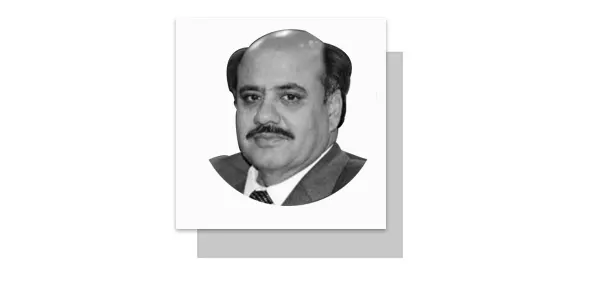PRIME Minister Narendra Modi and his cohorts have strived to sustain their popularity with the public through fictitious narratives and bellicose rhetoric.
They are taking their audience for granted and assume their concocted stories veil the failure of Indian armed forces’ unprovoked Operation Sindoor launched against the civilian targets in Pakistan.
This reckless military adventurism not only challenged Pakistan’s strategic restraint but also raised serious concerns about the potential risks and consequences.
Prime Minister Modi’s bruised ego obstructs him from approaching the current situation between India and Pakistan with rationality.
His hysterical, jingoistic propaganda, while having little impact on the Pakistani state and society, is a cause for concern among sane Indians and international security observers.
Their concerns are not only valid but also crucial in understanding the implications of Modi’s impromptu public speeches and the Sword of Damocles hanging over South Asia.
While Modi heralded the new normal as a national security imperative, its critics warned of potentially devastating implications.
Back on May 20, 2025, I penned an article for Pakistan Observer titled “Fictitious New Normal.
” Therein, I pointed out Modi’s new normal seems wishful thinking.
Pakistan’s counter-strikes dispelled any illusions of India’s conventional superiority or its ambitions to impose hegemony in the region.
Thus, the new normal is a balance of power/terror and Pakistan Air Force (PAF) superiority in South Asia.
Ironically, the Modi government continues to be in a state of denial.
The hawkish Indian media and BJP leaders are disgracefully portraying victory despite losing five fighter jets, including three Rafales, a MiG-29, an SU-30, and 84 drones.
Additionally, the S-400 battery systems at Adampur and Bhuj were effectively neutralized, while BrahMos storage facilities at Beas and Nagrota were destroyed.
Indian strategic pundits are bewildered by the demonstration of Pakistan Air Force (PAF) supremacy over the Indian Air Force (IAF) during the dogfight on May 7, 2025.
They are surprised to learn about the superior training, technology and tactics of the PAF.
However, what truly underscores the gravity of the situation is the international community’s dismay at Prime Minister Modi’s persistent war rhetoric.
His immature remarks, such as Pakistanis to ‘eat bread’ or else ‘my bullet is ready,’ are not expected from the Prime Minister of a nuclear-armed state.
According to the international media, Pakistan’s counter-offensive caused Indian military losses to run into billions of dollars.
To avoid further losses, New Delhi approached a third party—the United States—for a ceasefire on May 10, 2025.
The opposition parties in Lock Sabha and members of civil society are demanding to disclose the losses suffered by Indian armed forces in the four-day war with Pakistan.
Instead of responding to them, Prime Minister Modi is making childish, threatening statements, such as Operation Sindoor has only been suspended and not terminated.
Mr. Yashwant Sinha, former Vajpayee government minister of finance and later external affairs, opined: “He (Modi) asked for votes in the name of Pulwama martyrs during his election rallies (in 2019).
Now, this new incident (Pahalgam) is again being politicized for electoral benefit.
The government cannot continue hiding behind vague and fabricated statements.
” Congress’s Mr. Rahul Gandhi said why Modi “bowed down to Trump” and why Modi’s “blood boils only in front of cameras.
” Prime Minister Modi’s military misadventure and politicization of Sindoor (vermilion) immediately drew fierce criticism in India.
West Bengal Chief Minister Mamata Banerjee opined that Sindoor is a mark of self-respect and the prime minister should respect women instead of playing “political holi.
” She raised a pertinent question: why was he not giving Sindoor to his wife first?
She asked, “PM Modi is not the husband of anybody; why aren’t you giving Sindoor to your Mrs first?
The Pakistani ruling elite’s response to Modi’s xenophobia is encouraging.
They are handling the current turmoil in the regional strategic environment with confidence and coherence.
Prime Minister Shahbaz Sharif asked for a ‘neutral, transparent and credible investigation’ into the Pahalgam attack.
While celebrating the armed forces’ glorious performance in the Marka-e-Haq (The Battle for Truth), the official name given to the broader conflict with India from April 22 to May 10, 2025, they expressed willingness to start a dialogue with India.
General Sahir Shamshad Mirza, Pakistan’s Chairman of the Joint Chiefs of Staff Committee, reconfirmed on May 30, 2025, that during the four days of the war, Pakistan did not contemplate using nuclear weapons.
Simultaneously, he warned, “But you can’t rule out any strategic miscalculation at any time because when the crisis is on, the responses are different.
” He sounds correct because the recent conflict escalated horizontally and vertically.
India and Pakistan deployed modern, sophisticated weapons in the disputed territory of Kashmir and also attacked military installations in their mainlands.
Modi’s rhetoric may serve his internal political objectives and bolster the morale of Hindutva and ultranationalists rather than addressing the genuine governance and security needs of India.
This use of strategic rivalry with Pakistan to garner electoral support for the BJP is a risky gamble.
Such behavior could lead to catastrophic misjudgments with far-reaching consequences.
Hence, the Indians need to urgently examine Modi’s mental health and BJP political strategy for the sake of their security, economic prosperity and strategic stability in South Asia.
—The writer is Prof at the School of Politics and IR, Quaid-i-Azam University, Islamabad. (jaspal_99@hotmail.com)


















